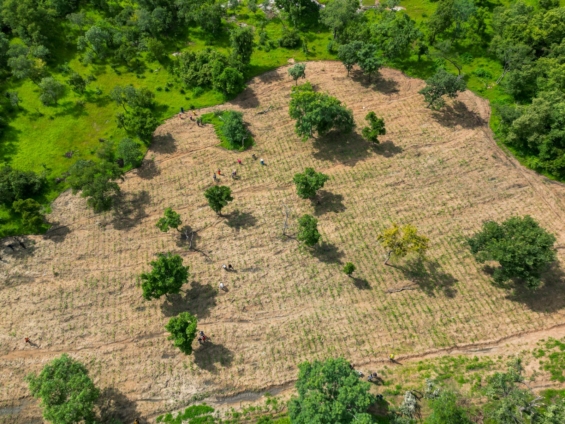Director of the Soil Research Institute of the Council for Scientific and Industrial Research (CSIR-SRI), Dr. Collins Korbla Tay is advocating for information on climate change mitigation and adaptation to be made readily available for effective implementation.
He is charging the Ghanaian science and technology community to focus on transferring knowledge on mitigation and adaptation measures to affected individuals, especially in agriculture.
He noted the strife for climate action should move beyond developing climate-smart practices to sharing the knowledge and skills for adoption.
He was speaking at the 35th annual general meeting of the Research Staff Association of the CSIR.
“It has become evident that this is less about developing new practices than making the available knowledge and skills widely available and supporting sustained implementation in the field.
“In particular, STI for climate change mitigation and adaptation should focus on information provision and knowledge transfer and include social, as well as technical, innovations,” he said.
Dr. Tay was proffering solutions on ways the country and researchers could adopt to ensure food security which is now threatened by climate change and other environmental crises.
He explains the food deficit currently experienced across the globe is as a result of lack of adequate information in science and technology.
“Food security is essential to a country but is challenged by factors such as lack of education and political instability; inadequate planning and policies; lack of transparency and improper governance, financing, slow paces in science and technology development, and other governance issues,” he said.
He believes enhancing these factors would contribute to improved food intake and less hunger.
Dr. Tay wants technologies adopted along the value chain in the agricultural space to ensure food security.
“Land preparation, soil and water management, seed production, weed management, pest and disease control, farm management, harvesting and such post-harvest practices like storage, processing, packaging, marketing and distribution are needed,” he said.
In recent months, Ghana has experienced a prolonged dry spell, impacting the lives of farmers and the food system, exposing the poor systems instituted to ensure the continuous production of crops.
Dr. Tay believes efficient irrigation technologies, water harvesting and conservation techniques can address water constraints in sub-Saharan Africa.
“Early warning systems in rainfed agriculture are also key to food security. Eighty (80%) percent of the estimated 1.4 billion hectares of global cropland is rainfed, accounting for approximately 60 percent of worldwide agricultural output.
“Accurate and reliable weather forecasts would enable farmers, especially near the equator to capitalize on rainfall for crop production in regions of extreme weather variability,” he said.
Latest Stories
-
Equatorial Coca-Cola Bottling Company acquires Voltic and West African Refreshments Limited
3 minutes -
National Service Authority farms over 5,000 acres of maize to support government’s ‘Feed Ghana’ Project
3 minutes -
Ghana, Korea strengthen climate cooperation for resilient and sustainable future
9 minutes -
Kimathi Rawlings steals the spotlight on the dancefloor with his ‘better half’! [VIDEO]
11 minutes -
Massive destruction by galamseyers uncovered in Jimira Forest Reserve
18 minutes -
EC’s decision to rerun Ablekumah North polling stations illegal and unacceptable— Justin Koduah
18 minutes -
Black Queens still a quality side – Desiree Ellis
22 minutes -
‘I make a solemn pledge to support Goldbod’ – Finance Minister Ato Forson
27 minutes -
$1.2bn worth of gold smuggled during economic crisis – Finance Minister Ato Forson
29 minutes -
BBC News team engages UniMAC-IJ students on podcasting and the future of journalism
32 minutes -
Afriyie Barnieh joins Swiss second-tier side FC Aarau on two-year deal
35 minutes -
Phase 1 of ‘Big Push’ infrastructure programme to begin this month -Road Minister
36 minutes -
Finance Minister calls for ruthless action against gold smugglers
37 minutes -
Ghanaian forward Ibrahim Osman set for AJ Auxerre loan spell
37 minutes -
Finance Minister backs Ghana Gold Board, commends progress
39 minutes

